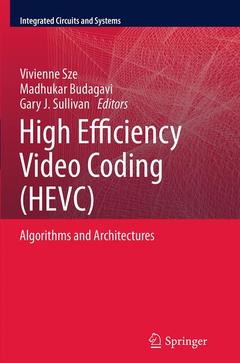Description
High Efficiency Video Coding (HEVC), 2014
Algorithms and Architectures
Integrated Circuits and Systems Series
Coordinators: Sze Vivienne, Budagavi Madhukar, Sullivan Gary J.
Language: English
Subjects for High Efficiency Video Coding (HEVC):
Publication date: 09-2016
Support: Print on demand
Publication date: 09-2014
375 p. · 15.5x23.5 cm · Hardback
Description
/li>Contents
/li>Biography
/li>Comment
/li>
This book provides developers, engineers, researchers and students with detailed knowledge about the High Efficiency Video Coding (HEVC) standard. HEVC is the successor to the widely successful H.264/AVC video compression standard, and it provides around twice as much compression as H.264/AVC for the same level of quality. The applications for HEVC will not only cover the space of the well-known current uses and capabilities of digital video ? they will also include the deployment of new services and the delivery of enhanced video quality, such as ultra-high-definition television (UHDTV) and video with higher dynamic range, wider range of representable color, and greater representation precision than what is typically found today. HEVC is the next major generation of video coding design ? a flexible, reliable and robust solution that will support the next decade of video applications and ease the burden of video on world-wide network traffic. This book provides a detailed explanation of the various parts of the standard, insight into how it was developed, and in-depth discussion of algorithms and architectures for its implementation.
About the Editors
Vivienne Sze is an Assistant Professor at the Massachusetts Institute of Technology (MIT) in the Electrical Engineering and Computer Science Department. Her research interests include energy-aware signal processing algorithms and low-power circuit and system design for portable multimedia applications. Prior to joining MIT, she was with the R&D Center at Texas Instruments (TI), where she represented TI in the JCT-VC committee of ITU-T and ISO/IEC standards body during the development of HEVC (ITU-T H.265 | ISO/IEC 23008-2). Within the committee, she was the Primary Coordinator of the core experiments on coefficient scanning and coding and Chairman of ad hoc groups on topics related to entropy coding and parallel processing. Dr. Sze received the Ph.D. degree in Electrical Engineering from MIT. She has contributed over 70 technical documents to HEVC and has published over 25 journal and conference papers. She was a recipient of the 2007 DAC/ISSCC Student Design Contest Award and a co-recipient of the 2008 A-SSCC Outstanding Design Award. In 2011, she received the Jin-Au Kong Outstanding Doctoral Thesis Prize in Electrical Engineering at MIT for her thesis on “Parallel Algorithms and Architectures for Low Power Video Decoding”.
Madhukar Budagavi is a Senior Member of the Technical Staff at Texas Instruments (TI) and leads Compression R&D activities in the Embedded Processing R&D Center in Dallas, TX, USA. His responsibilities at TI include research and development of compression algorithms, embedded software implementation and prototyping, and video codec SoC architecture for TI products in addition to video coding standards participation. Dr. Budagavi represents TI in ITU-T and ISO/IEC international video coding standardization activity. He has been an active participant in the standardization of HEVC (ITU-T H.265 | ISO/IEC 23008-2) next-generation video coding standard by theJCT-VC committee of
Provides video application developers with invaluable reference to the latest video standard, High-Efficiency Video Coding (HVEC)
Serves as a companion reference, complementary to the standards document issued by JCT-VC
Includes in-depth discussion of algorithms and architectures by video experts who actually developed the standard
Provides insight into the reasoning behind the development of the HVEC tools, which will aid in understanding of the standard
These books may interest you

Next Generation Mobile Broadcasting 172.36 €



